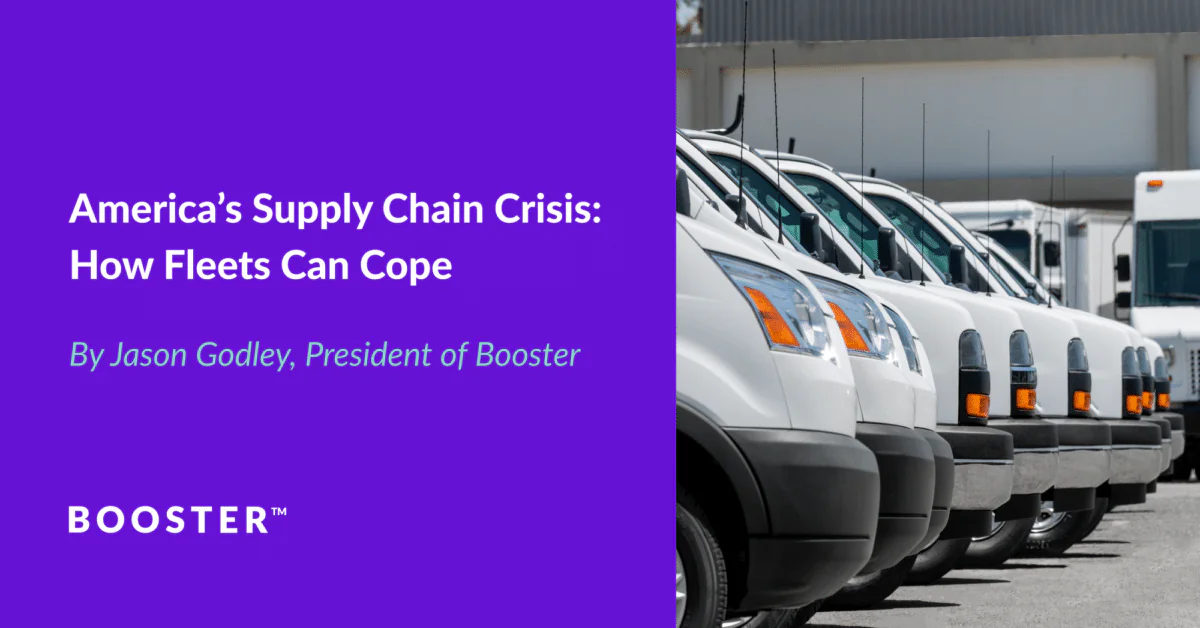As analysts, economists and the media have recently observed, America is experiencing a supply chain crisis.
While at home we may feel the impacts in the form of used car shortages, rising consumer goods prices or missing toilet paper, businesses—particularly last mile fleets—experience it differently.
On a good day, the burdens fleet managers face are many: complex operations, delivery delays, regulatory risk, environmental liability and fuel price gouging, to name a few. Now with the supply chain crisis, top concerns according to Automotive Fleet include adapting to the increasing national and corporate focus on sustainability.
As President of Booster, the leading provider of last-mile fuel delivery services for fleets, I can attest to some of the strategic actions that can be taken to combat supply chain headaches ahead of the busiest delivery season of the year.
Offer a Compelling Driver Value Proposition
A thriving driver community is one of the key elements of unlocking and maintaining supply chains.
The labor shortage is real, and this shortage is perhaps the most significant marker of failing supply chains as demand for professional drivers significantly outweighs supply in the labor market.
According to data compiled from the U.S. Census Bureau, driving a truck is the most common job in 29 of the 50 states. The opportunity is certainly there, but for many last mile service providers, drivers are the hardest positions to fill.
Booster is itself a fleet, and we understand that scaling our business requires us to maintain robust hiring pipelines of Booster Service Professionals and, once those drivers are hired, to treat them well.
For Booster, this means offering the best pay and benefits possible. We offer our drivers a highly-competitive compensation package: health insurance, equity in the company, vacation time, and a career path into a variety of other roles. We do this because we believe that investing in our employees leads to more purpose and joy in the workplace, and therefore better outcomes for our customers.
Use Data and Intelligence to Optimize Operations
Fleet managers often have aggressive goals to achieve, and are consequently focused on servicing their customers and keeping costs down. This means that vehicle downtime, fuel pricing, labor, and routing efficiency are some of the many important factors to consider when managing fleet productivity. These elements, coupled with the addition of ambitious corporate decarbonization goals, result in the need for strong data. Through actionable insights, fleet operators can better optimize for each of these inputs to increase both the productivity and the sustainability of their service offerings.
Many of Booster’s customers share data and operational information with Booster. This data is translated into valuable insights for fleets thus enabling them to make more informed decisions to achieve their strategic and operational objectives.
Booster helps track labor savings (less time spent refueling), reduce vehicle miles traveled (removes trips to the gas station), save on fuel costs (competitive pricing), and lower CO₂ emissions, among other things.
Tracking the data and using it to manage business process improvements is one of the most effective ways to optimize operations. Despite being in the middle of a supply chain crisis, in 2020 Booster helped our customers save $8.8 million, avoid more than 2.2 million vehicle miles traveled and avert nearly 2 million pounds of CO₂ emissions.
Reduce Complexity and Simplify Operations
Operations leaders understand that eliminating unnecessary steps in one’s delivery model reduces complexity and increases productivity.
For instance, the average trip to the gas station takes 20 minutes of additional time on the clock. By reengineering the fuel delivery supply chain, and delivering fuel directly to vehicles, Booster eliminates this unnecessary step and thereby simplifies fleet operations.
Here, the use of mobile fueling not only supports easier navigation through the current supply chain challenges but also the added benefit of keeping fuel costs controlled and reducing up to 70% of emissions, depending on fuel type.
The supply chain crisis is not just America’s issue—it is a global issue. We like to say that Booster provides businesses with an “easy button” to not only navigate the current disruptions and improve efficiency, but also position themselves for long-term success.
Bottom line, while the global vehicle supply situation is not within our control, it is possible to do more with what we have. With an improved hiring plan, data intelligence optimizations, and by reducing operational complexity, we can greatly improve outcomes for ourselves and our customers.
